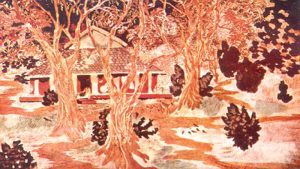
Tagore’s love of Nature was extremely subtle. For him the wide-open skies, spaciousness, and tranquillity of the countryside symbolised freedom. His numerous writings reveal the intensity of his relationship with nature wherein Nature in her various moods has been the inspiration. Tapati explores Tagore’s love for Nature and environment, in the Special Feature, exclusively for Different Truths.
We celebrate World Earth Day, World Environment Day, and few more to create awareness towards a clean pollution-free world environment. It is done with much fanfare all over the world. But it is amazing to see how Rabindranath Tagore thought of the importance of protecting Nature, the environment, and the greeneries around so many years ago in drastic contrast of the highly civilised society where man completely alienated himself from Nature.
Tagore’s love of Nature was extremely subtle. For him the wide-open skies, spaciousness, and tranquillity of the countryside symbolised freedom. His numerous writings reveal the intensity of his relationship with nature wherein Nature in her various moods has been the inspiration. The vast Nature caught hold of his imagination as a boy when he was confined to the four walls of the house and looked longingly at the world of Nature outside the railings of his veranda with a sense of wonder and mystery.
He described: “I still remember a day in my childhood when I was made to struggle across my lessons in a first primer, strewn with isolated words smothered under the burden of spelling…. Suddenly, I came to ‘a rhymed sentence of combined words, which may be translated thus – ‘it rains, the leaves tremble’. At once I came to a world wherein I recovered my full meaning. My mind touched the creative realm of expression, and at that moment I was no longer a mere student with his mind muffled by spelling lessons, enclosed by a classroom”.
His poems not only treat the transient beauty of Nature by describing whatever is arresting and stunning in Nature, but they penetrate the visual beauty within and speak of a divine presence revealed in its splendour.
Nature includes the whole universe that includes the Creator, the cosmos, and its creatures. The Rishis of the past have always had a great respect for Nature. His awareness of the divine in all the forms that Nature displayed – the river, the sky, and the birds – is reflected in his songs and poems. Even in the seasonal change of Nature Tagore found a divine touch. He penned:
“In the fragrant days of sunny April through the forest path
he comes, comes, and ever comes.
In the rainy gloom of July nights on the thundering chariot of clouds
he comes, comes, ever comes.”

In Gitanjali Tagore observed, “The same stream of life that runs through my veins night and day runs through the world and dances in rhythmic measures.
It is the same life that shoots in joy through the dust of the earth in numberless blades of grass and breaks into tumultuous waves of leaves and flowers.
The collection of poems, Banabani (Voice of the Forest) contains some of his best Nature poetry. The poet has composed more than four hundred songs on the glory of Nature. In all these songs the description of Nature has been vivid. Plants, spring, autumn, winter, summer, flowers all seem to converse with Tagore. His approach to Nature is with blended feelings of affection, gratitude, and reverence. Every phenomenon of Nature is described, eulogized and brought into a tender relationship with humanity. To him, man has emerged out of Nature. Nature is the mother of man.
Tagore believed that man is supposed to live in harmony with Nature and recognise that divinity prevails in all elements including plants and animals; otherwise, if he wished to walk upon the single way of human development, he would lose his balance. From his extensive writings about the relation of man to Nature, we discover that the experience of the world is not isolated from the experience of Nature. Along with her beauty and appeal, Nature’s meaning and purpose were equally important to him where both were indispensable elements. Nature was not merely a showcase of objects but a habitation wherein man’s place was splendid and significant. Nature without man would be a ‘broken arch’ and man without Nature a ‘deserted land’.
His compositions immersed in the cycle of day and night, the order of seasons, absorbing from his surroundings. At the same time, he was pained that humanity was seen in futile opposition to the great forces of Nature. With human intelligence and development of science, the man had always been trying to overpower Nature and become the sole owner of this earth. But with her tremendous capacity for destruction and regeneration, Mother Nature had always shown herself in control of man’s progress and she had always triumphed. Tagore was greatly disturbed on over-exploitation of Nature and tried to ignite a thought process in the people around. Thus we find poems that show his deep concern about the surrounding Nature. He was very much advance in contemporary times regarding awareness about a pollution free environ.
His great mind was so sensitive about the environ, that he chose, not an urban centre but a rural place in West Bengal as his revered location of all experiments, where the birds would chipper amid greeneries, where the rain would patter on the new leaves of summer, the tremor of the crickets’ chirp would trouble the shade of the tree and the river overflow its bank washing the village meadows.
At Santiniketan, classes were held outdoors because he believed that “nature [is] the greatest of all teachers” and that “children should be surrounded with the things of nature which have their own educational value.”
Thus, Plantation Day became the most precious day of the rainy season in remembrance of the beginning of a new life. He expressed: “While accepting gifts from nature man became greedy. Distancing the forest, he won the lands for farming. Slowly he removed the vale of shadow from the face of Mother Earth leaving her denuded. Keeping this development in mind, I started the Plantation Day, a festival to by an extravagant child to repay the burden of gifts by his caring mother.”
On the following, another festival is held, known as Halakarshan which means furrowing the soil for farming. Apart from these two, Rabindranath introduced festivals celebrating each season of the year. He had composed innumerable songs, poems, dramas to remind the changing cycles of nature and human emotions.
22nd Shravana, a monsoon month in Bengali calendar, was the day Rabindranath had left this world. This day is remembered as the Plantation Day at Santiniketan, his abode. The day is marked by chanting special poems composed by Tagore to invoke blessings from the five elements of Nature; Earth, Water, Sun, Air and Outer Space are the five elements of Nature worshipped as deities in charge of all creatures and lives on this earth and this concept prevails since Vedic times. Five children are dressed up as embodied figures of these elements, known as Panchabhuta and recite the poems to invoke blessings on the young plant. The program is enthralled by the inspiring song Rabindranath composed towards the preservation of Nature and environ as:
Oh great souls, fly the banner to conquer the deserts.
Oh the tender soul, bless every speck of dust on this earth with great piety.
Let the ever silent soil sing the song of your glory,
Oh beautiful soul, encompass with flowers and greeneries.
Oh my traveller friend, come for a rest under the shadow of trees,
Come oh the playmate of winds and enthral the blue sky.
In the dawn aspire hope on the woods and
in the dusk, bless them with deep sombre.
Oh Great Mind, sing the tune of a peaceful corner on this earth.
Today, the world has introduced the Wildlife Act, The Water Act, The Air Act, The Forest Conservation Act to protect our environ. But Tagore had pioneered the cause to preserve the Nature and environment many years ahead of this generation.
Photos from the Internet
#RabindranathAndEnvironment #Shantiniketan #TributeToTagore #LoveForNature #EathDay #EnvironmentDay #PlantationDay #DifferentTruths








 By
By
 By
By
 By
By
Wonderful read